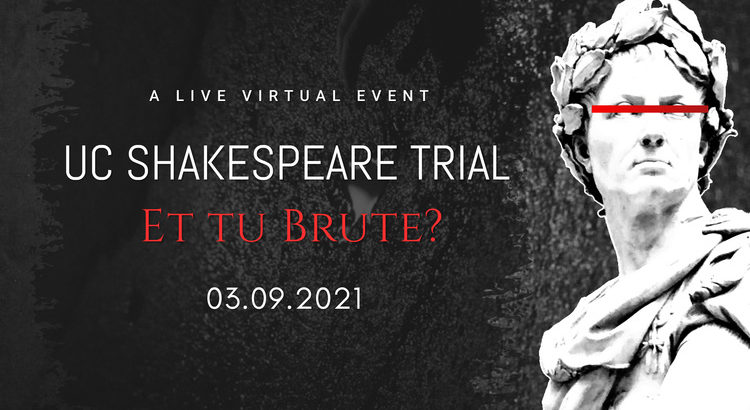As a pre-law student who loves the arts and humanities, this event had me geeking out. In their third annual Shakespeare Trial, University of California at Irvine was able to expand their audience to people across the country like me who wanted to tune in to have a say in Marcus Brutus’ criminal trial.
“Friends, Californians, Zoomers, lend me your screens,” began the prosecuting attorney Dean Erwin Chemerinsky of Berkeley Law. Using the text of Shakespeare’s “Julius Caesar” as evidence, and California law as the foundation of the trial, the trial centered around two questions: 1) Is Marcus Brutus guilty of the murder of Caesar? and 2) Is Marcus Brutus guilty of inciting insurrection? Professor Bernadette Meyler of Stanford Law argued that Brutus applies for the necessity defense–that he was protecting himself and the Roman Republic from immediate harm by killing his dear friend Caesar.
Prior to the official start of the trial, we were treated to monologues from the characters of Brutus and Antony, performed by the talented actors of the New Swan Shakespeare Company, to set the scene and bring the characters to life.
Completely unscripted and organized like a criminal trial, I enjoyed watching the seasoned lawyers make strong, compelling arguments in front of The Honorable Andrew Guilford Presiding. Brutus’ killing of Julius Caesar, and whether or not Brutus applies for the necessity defense, is a heavily political question. During the trial, the attorneys were not afraid of using parallels to our modern times to create an understanding of the gravity of the situation. 
I loved the concept of courtroom as theatre, audience as jury, and the idea of exploring Shakespeare through legal inquiry. What I am so interested in, in my own academic studies, is the intersection between the humanities and social sciences. Because both are things created by people, they are interconnected and important to each other. What can we learn when we examine one with the lenses we typically reserve for the other? In this specific case, what can we learn from Shakespeare putting it in this new light? How does putting Brutus on trial cause us to look more critically at the play’s text and thoughtfully formulate our own opinions about the events that occur?
At the end of the trial, the Zoom audience voted to decide the verdict via Zoom poll. It was decided that Brutus was guilty of the murder of Julius Caesar, and by a smaller margin it was decided that he was not guilty of inciting insurrection.
I’m glad that I was able to attend this event, and I encourage those of you who miss live arts events as dearly as I to look for amazing events that would normally be restricted to geographical location, that are now accessible through online platforms.


